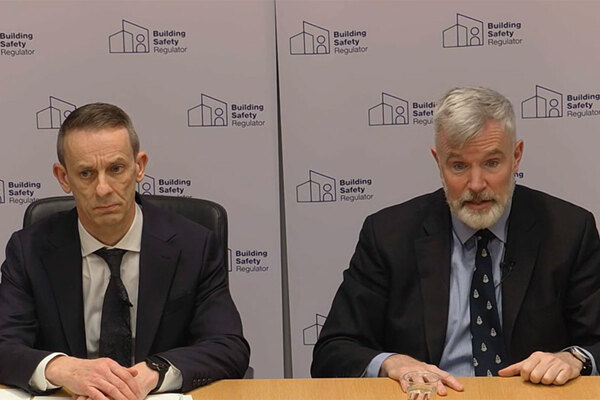You are viewing 1 of your 1 free articles
RSH judgements: Four landlords retain their grades
Four social landlords have retained their grades in the latest round of judgements from the Regulator of Social Housing (RSH).
The regulator confirmed Anchor’s top grades of G1 and V1, while Gateway, The Guinness Partnership and Thrive Homes retained grades of G1 and V2.
The regulator also removed regulatory notices for Empower Housing Association and Bespoke Supportive Tenancies. The latter remains non-compliant with the Governance and Financial Viability Standard.
According to the judgements, Gateway, Guinness and Thrive Homes all comply with the Governance and Financial Viability Standard.
Three of the landlords are identified as have less capacity to deal with “adverse” scenarios over their investment plans.
Gateway is increasing planned investment in its existing homes, including on fire and building safety and energy efficiency work.
The RSH concluded that “this has a detrimental impact on interest cover”.
“Gateway is also anticipating that further spending on energy efficiency works may be required in its next financial plan.
“When coupled with the current economic uncertainty in relation to inflation and interest rates, these factors reduce Gateway’s capacity to deal with adverse scenarios,” according to the judgement.
Guinness is increasing investment in existing homes for building safety and energy efficiency work.
“Delivering this investment, in combination with the economic uncertainty in relation to inflation and interest rates, weakens its financial performance and reduces the capacity available to respond to adverse events,” the regulator said.
A spokesperson for The Guinness Partnership said: “We welcome confirmation of our G1/V2 gradings following our recent IDA [in-depth assessment].
“The financial and economic pressures – which are having an impact across the sector – are reflected in our regulatory judgement.
“Our increased investment in our homes has also been recognised.
“We are pleased that the regulator is assured as to our financial plans and forecasts, and our governance arrangements”.
Thrive is also increasing investment in existing homes and continuing to develop new homes, “which puts pressure on its financial performance”, the regulator said.
“As a result, Thrive will be reliant on income from sales to meet interest costs in the short term.
“These factors, in combination with economic uncertainty in relation to inflation and interest rates, reduce Thrive’s capacity to respond to adverse events,” it said.
Elspeth Mackenzie, chief executive of Thrive, said: “We are delighted to have retained our G1 rating in the latest judgement.
“A good IDA outcome reflects the hard work throughout the business to ensure we are delivering good services and meeting the standards set by the regulator.
“It recognises that our organisation is stable, well run, and capable of achieving our strategic aims of growth whilst continuing to invest in our existing operations.
“This judgement also reflects the challenges of the external environment we are currently operating within, coupled with Thrive’s strategic ambitions.
“As part of the ongoing business planning process, Thrive’s executive team continues to work closely with the board to develop, and where necessary, adapt its plans whilst monitoring changes to the external environment.”
Sarah Jones, chief executive at Anchor, said: “We are very pleased that, following an in depth assessment, the RSH has maintained our G1 rating for governance and V1 rating for viability.
“These are the highest possible ratings and demonstrate the strength of our financial position, business plans and risk control framework.
“It also follows the affirmation of our A+ stable rating from S&P Global, which reflects continuing strong demand for our services.”
The regulator removed a regulatory notice for Empower, which was found non-compliant for governance in September 2021.
Although it does not give grades to small providers with fewer than 1,000 homes, the regulator posts a notice if it finds a provider is not meeting standards.
It said the issues giving rise to the notice “have been resolved”.
Sara Sharrock, chief executive of Empower, said: “It is a great achievement for Empower to be classed as compliant with the regulatory standards.
“Our colleagues and Board are skilled and passionate and have been totally dedicated to implementing the agreed action plan to ensure we meet the regulatory standards whilst continuing to provide safe & suitable homes for our tenants.
“As a team we are fully committed to the continued compliance and future growth of Empower.”
In May 2019, the RSH published a notice declaring that Bespoke Supportive Tenancies, a lease-based association, was non-compliant with the governance and viability elements of the Governance and Financial Viability Standard.
The organisation manages more than 1,400 homes for people with learning disabilities and other mental health needs. Its homes are owned by investment funds, which lease them to the association.
In August 2019 the regulator found it in breach of the Home Standard over overdue checks and risk assessments for gas, fire, electric, asbestos and legionella.
Today, the regulator found that Bespoke Supportive Tenancies is no longer in breach of the Home Standard, but remains non-compliant.
The latest judgements follow a string of viability downgrades amid significant financial pressures facing the sector.
Two housing associations were downgraded from V1 to V2 in March.
Fourteen housing associations were downgraded for financial viability in December.
It followed 19 housing associations being downgraded for financial viability in mid November, with another 15 at the end of the same month.
Update: at 5.45pm on 4.5.2023:
An original version of this story said the investment had caused the organisation’s viability to weaken. This was amended to say ’resilience’ to avoid any confusion over the fact that viability grades have not been reduced.
Update: at 9.17am on 1.6.2023:
An original version said that the regulator changed the basis for housing associations’ viability grades over investment in existing homes. This was inaccurate and has been amended to say simply that Thrive, Guinness, and Gateway retained their grades.
Sign up for our regulation and legal newsletter
Already have an account? Click here to manage your newsletters
Related stories












